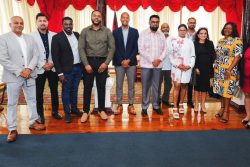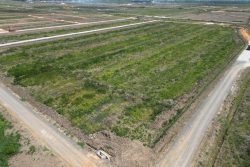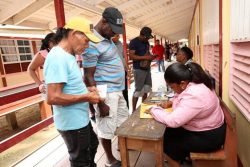As part of efforts to reduce the high rates of crime and violence which are fuelled by illicit firearms trafficking, the Caribbean Community Implementation Agency for Crime and Security (CARICOM IMPACS) recently hosted a meeting at its headquarters in Port-of-Spain, Trinidad and Tobago, where the matter was discussed at length, an IMPACS release stated recently.
At the hybrid meeting which was attended by United States (US) partners and CARICOM Commissioners of Police, ways were explored to further improve the collaboration with the CARICOM Crime Gun Intelligence Unit (CGIU) to not only stem the wave of firearms-related crimes which are pervading the Caribbean Region’s national and regional borders, but to successfully prosecute all those who are involved in the illicit firearms trade.
Minister of National Security of Trinidad and Tobago, Fitzgerald Hinds, in his remarks spoke of the high incidents of gun-related crimes across the region. He pointed out that the Caribbean region’s transshipment utility, in relation to the routes exploited between some territories and the European Union (EU), and more closely, the US, was proving to be very lucrative for the business of illegal arms and ammunition trafficking.
Hinds also took the opportunity to commend CGIU for its assistance to CARICOM member states in the investigation of the perpetrators and co-conspirators of US-sourced weapons being illegally trafficked into the region. “Given our shared concerns, and our common goal for a safer, and more secure hemisphere, I look forward to the updates on the good work that has begun, and relevant perspectives on what can be done to strengthen and enhance the CGIU.”
Meanwhile, Assistant Secretary, US Bureau of International Narcotics and Law Enforcement Affairs (INL), Ambassador Todd Robinson, echoed Hinds’ sentiments, adding that the US and Caribbean partners share a common goal of addressing the high rates of crime and violence which are fuelled by illicit firearms trafficking.
Robinson assured the gathering that the US is prioritising investigations and prosecutions of firearms traffickers, who actively endanger communities in both the US and the Caribbean. He affirmed that “the INL intends to continue to support the CGIU, which has had a great impact on realtime information sharing.”
And US Ambassador to Trinidad and Tobago, Candace Bond, warned that illicit firearms trafficking remains a critical threat to the peace and stability of the Caribbean “because it fuels violence and empowers criminal organisations,” which undermines collective efforts to promote safety and security for all.
To support the CGIU and its work in countering firearms and narcotics trafficking, Ambassador Bond announced that the US would be donating a 75-inch interactive smartboard, 14 Samsung 27-inch monitors, and a four-year old Belgian Malinois sniffer dog, trained to detect narcotics, firearms, and ammunition.
“The US recognises and supports the efforts of the CGIU, which is a practical tool in our shared battle against gun-related crimes and is also a model of regional cooperation,” she added.
Also in attendance was Associate Deputy Attorney General of the US Department of Justice (DoJ) and US Coordinator for Caribbean Firearms Prosecutions, Michael Ben’Ary, who indicated that the DoJ was looking forward to strengthening its collaboration with Caribbean law enforcement partners, especially the CGIU. He mentioned that the partnership was important for tackling the illicit firearms trade.
“Partnerships and putting firearms tracing results to full use, in my estimation, are the key to detecting, disrupting and dismantling the firearms traffickers responsible for so much violence and criminal behaviour affecting our nation of the US and also our partner nations here in the Caribbean Region.”
Giving some insight into the genesis of the CGIU was Executive Director, CARICOM IMPACS, Lieutenant Colonel Michael Jones, who explained that it was established in partnership with United States’ INL as an innovative resource for the region, to merge and fuse firearms data and information and provide actionable intelligence and insights with a view to improving investigations and increasing successful prosecutions.
He also noted that the unit is making an impact. “In less than one year since its establishment, we are already seeing the benefits of the Unit which is stationed at CARICOM IMPACS’ headquarters. To date, the CGIU has received information and intelligence on firearms seizures and recoveries from 15 CARICOM Member States and has launched at least 34 investigations.”
Jones emphasised the collaborative effort of the CGIU which is staffed by seconded and vetted officers from CARICOM member states who have been working alongside US agencies such as the Bureau of Alcohol, Tobacco, Firearms and Explosives (ATF), Homeland Security Investigations (HSI), Customs and Border Protection (CBP) and the Bureau of Industry and Security (BIS), to assist in initiating and conducting firearm related investigations.
According to the release, representatives of the CGIU delivered a presentation on its achievements to date, its efforts in Operation Hammerhead, as well as other regional investigations and prosecutions.
Joining the meeting remotely were representatives from the BIS and ATF together with CARICOM Commissioners of Police representatives from Antigua and Barbuda, Barbados, British Virgin Islands, Grenada, Guyana, Jamaica, St. Kitts and Nevis, St. Lucia and St. Vincent and the Grenadines. Trinidad and Tobago had in-person representation, the release informed.








